Table of Contents
Puppies are so adorable; watching them grow and learn is so much fun.
But as with any new pet, there are some things you need to know to keep your puppy healthy and happy.
One of those things is, “why is my puppy breathing hard?” and how to tell when your puppy is having trouble breathing.
If your puppy is panting and breathing hard for no apparent reason, it could signify something wrong.
Puppy respiratory problems can be caused by environmental factors, such as smoke or chemical fumes, or health problems, such as heart disease.
So if your puppy has trouble breathing, it’s essential to take him to the vet immediately for diagnosis and treatment.
Learn more about how to tell if your puppy is having trouble breathing in this blog post!
Why Is My Puppy Breathing Fast? Is Something Wrong?
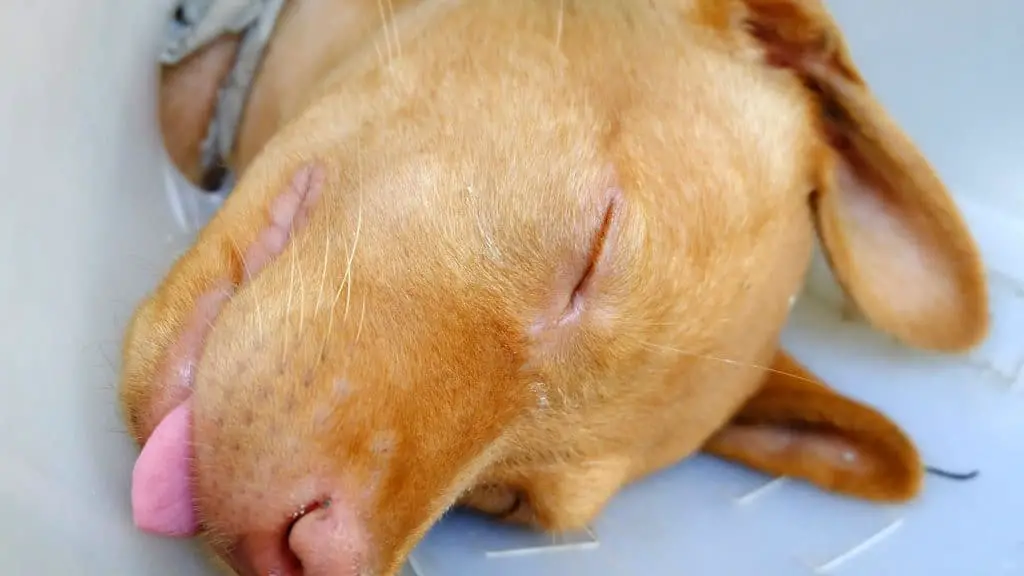
If you’ve noticed your dog breathing rapidly, you might have wondered if something was wrong.
After all, dogs are usually quite efficient at regulating their breathing so rapid breathing can indicate an underlying problem.
However, there are also a few perfectly normal reasons your dog might be breathing fast.
For example, exercise and excitement can both cause your dog’s heart rate to increase, leading to faster breathing.
If your dog is panting heavily after a play session or a walk, there’s no need to worry – they’re just working to regulate their body temperature and replenish lost fluids.
However, if your dog is panting excessively or having difficulty breathing, it could be a sign of a more severe problem, and you should consult your veterinarian.
How Can a Veterinarian Diagnose a Dog’s Breathing Problems?
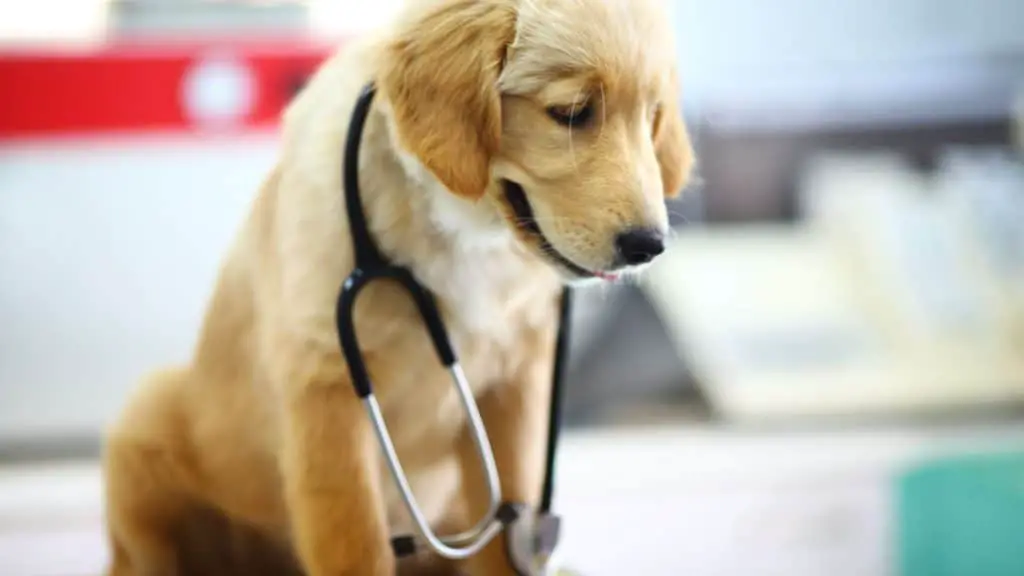
If your dog has difficulty breathing, the first step is to take him to the veterinarian for a diagnosis.
The veterinarian will ask about your dog’s symptoms and perform a physical examination.
He may also order tests, such as a chest X-ray, to help determine the cause of the breathing problems.
Some of the most common causes of breathing problems in dogs include:
- Allergies
- Asthma
- Bronchitis
- Congestive heart failure
- Pneumonia
- Pulmonary edema
- Tracheal collapse
Once the veterinarian has diagnosed the cause of your dog’s breathing problems, he will be able to recommend treatment.
Treatment will vary depending on the underlying cause but may include medication, oxygen therapy, and changes to your dog’s diet or environment.
With proper treatment, most dogs can live happy and healthy lives despite breathing difficulties.
How Can I Tell if My Dog Is Breathing Too Fast?

One way to tell is to watch the dog’s ribs.
If you can see the dog’s ribs moving quickly and easily, the dog is probably breathing too fast.
Another way to tell is to feel the dog’s chest. If it feels like the dog is breathing very hard, it is probably breathing too fast.
How Do I Know if My Dog Is Breathing Too Fast?

If your dog is panting heavily and breathing rapidly, it may be a sign that they are not getting enough oxygen.
This can be a severe problem, especially for puppies, and should be addressed by a veterinarian as soon as possible.
Other symptoms of respiratory distress include coughing and gagging. If you notice these signs, take your dog to the vet immediately.
When Should I Contact My Vet About My Dog’s Breathing?

Dogs breathe differently than humans; in most cases, their fast breathing is nothing to worry about.
However, you should contact your vet a few times about your dog’s breathing. If your dog has trouble breathing, wheezing, or gasping for air, it’s time to call the vet.
Other signs that something may be wrong include coughing, vomiting, or exercise intolerance.
If you notice these signs in your dog, get in touch with your vet immediately.
Why Is My Dog Breathing so Fast?

Dogs breathe fast when they are excited, afraid, or in pain. If your dog is panting and you don’t know why take him to the vet.
You might have wondered why if you’ve noticed your dog panting excessively.
Dogs pant for various reasons, including heat, exercise, and excitement.
However, if your dog is panting more often, it could indicate an underlying health condition.
One common reason for excessive panting is anxiety.
Like humans, dogs can experience stress from stressful situations, such as loud noises or being left alone.
If your dog is panting due to anxiety, you might notice other signs, such as pacing or trembling.
Another potential cause of excessive panting is a heart condition.
If your dog’s panting is accompanied by coughing or difficulty breathing, it’s essential to seek veterinary care as soon as possible.
While panting is usually nothing to worry about, it’s always best to avoid caution.
Dog Labored Breathing Causes Pain

One of the most common things I hear from dog owners is that their dog is panting and in pain.
While it’s true that dogs do pant for various reasons – including being overheated, anxious, or excited – it can also be a sign of something more serious.
If your dog is panting excessively and seems to be in pain, it could be a sign of congestive heart failure.
This condition occurs when the heart cannot pump blood effectively, leading to fluid buildup in the lungs.
This can cause difficulty breathing, as well as coughing and labored breathing.
Dog Respiratory System
Just like humans, dogs need to breathe to live. But how do they do it?
Let’s look at the anatomy of the dog’s respiratory system and how it works.
The main difference between human and dog respiratory systems is the number of bones involved.
Humans have 34 bones in their respiratory system, while dogs have only 30.
The canine respiratory system is also shorter than the human one, which makes sense given that dogs are smaller than humans on average.
Like all mammals, dogs have lungs made up of tiny sacs called alveoli.
These alveoli are where oxygen from the air enters the bloodstream, and carbon dioxide is expelled.
Dogs have a network of blood vessels called pulmonary arteries and veins that transport oxygen-rich and carbon dioxide-rich blood to and from the lungs.
The trachea, or windpipe, is another essential part of the dog’s respiratory system.
It’s a tube that connects the throat to the lungs and helps to carry air back and forth.
The trachea branches into smaller tubes called bronchi, which lead to the individual alveoli in the lungs.
Just like humans, dogs need to breathe to live.
But how do they do it?
By taking in air through their nose or mouth and passing it through their trachea, bronchi, and alveoli, oxygen enters their bloodstream, and carbon dioxide is expelled.
So next time you see your puppy panting away on a hot day, you’ll know that they’re just trying to keep their cool – literally!
What Are the Symptoms of Respiratory Problems in Puppies

At first glance, it can be difficult to tell if a puppy has respiratory problems. After all, they’re still small and pant a lot anyway.
However, some key symptoms to look out for can help tell if your furry friend has difficulty breathing.
One of the most common signs is an increased rate of panting and difficulty catching their breath.
If your puppy is also making grunting noises when they breathe, this is another cause for concern.
Additionally, if your puppy’s gums are pale or blue, this could indicate a lack of oxygen and warrant a trip to the vet immediately. May other health problems can cause respiratory distress in puppies, so it’s always best to avoid caution and have them checked out as soon as possible.
How Are Respiratory Problems in Puppies Treated
Most respiratory problems in puppies are caused by a virus, such as parainfluenza, Bordetella bronchiseptica, or adenovirus type.
These viruses are highly contagious and are often spread through coughing and sneezing.
Puppies with respiratory problems may have a fever, runny nose, and cough.
In severe cases, they may have difficulty breathing and need to be hospitalized.
Treating respiratory problems in puppies typically involves supportive care, such as providing plenty of rest, fluids, and fresh air.
In some cases, antibiotics may also be prescribed to help clear the lungs of bacteria.
If your puppy has difficulty breathing, it is essential to seek veterinary care immediately. Respiratory problems can quickly become life-threatening in young puppies.
What Can You Do to Prevent Respiratory Problems in Your Puppy?
Respiratory problems in puppies are unfortunately all too common. But there are steps that you can take to help prevent these issues from developing in the first place:
- Make sure that your puppy is getting plenty of exercise. This will help to keep their lungs and airways clear.
- Avoid exposing your puppy to smoke, dust, and other airborne irritants. These can trigger an inflammatory response in the lungs and lead to respiratory problems.
- Ensure your puppy is vaccinated against common respiratory diseases such as parvovirus and distemper.
These precautions can help keep your puppy’s lungs healthy and prevent respiratory problems.
Additional Resources on Respiratory Problems in Puppies
If you think your puppy may be suffering from respiratory problems, it is essential to seek veterinary care immediately.
The following resources can provide additional information on the signs, symptoms, and treatment of respiratory problems in puppies:
The Respiratory System of Dogs: An Overview
- Breathing Problems in Puppies
- Respiratory Infections in Puppies
- Puppy Respiratory Distress Syndrome
What Should I Do if My Dog Has Breathing Problems?

If your dog is having trouble breathing, it’s essential to take them to the vet as soon as possible.
Dogs can have trouble breathing for various reasons, including allergies, infections, and heart conditions.
While it can resolve some breathing problems relatively quickly, others can be more serious and require more intensive treatment.
If your dog is having difficulty breathing, you can do a few things to help them until you reach the vet.
First, try to keep them calm and comfortable. If they are panicking, it will only make it harder for them to breathe.
Second, open their mouth and check to see if their tongue or anything else is blocking their airway. If so, gently remove the obstruction.
Finally, if your dog is small enough, you can try lifting them onto your shoulders, so they are upright.
This will help them to get more air into their lungs.
Remember, if your dog is having trouble breathing, don’t wait to get them to the vet – every moment counts!
What Are Some Common Causes of A Puppy’s Breathing Difficulty

Puppies are cute, cuddly, and often full of energy. But sometimes, they can also have trouble catching their breath.
Breathing difficulty in puppies can be caused by several things, including Congenital heart defects, Respiratory infections, Allergies, and Anatomical abnormalities.
One of the most common causes of breathing difficulty in puppies is congenital heart defects.
These defects can involve the structure of the heart, the size of the heart, or the way that blood flows through the heart.
If your puppy has a congenital heart defect, you may notice that they tire easily and has trouble breathing after physical activity.
If you think your puppy may have a congenital heart defect, it’s essential to make an appointment with your veterinarian as soon as possible.
Respiratory infections are another common cause of breathing difficulty in puppies.
Infections such as canine distemper and Bordetella can cause inflammation of the lungs and airways, making breathing difficult for your puppy.
If you think your puppy may have a respiratory infection, it’s essential to take them to the veterinarian for treatment as soon as possible.
Allergies can also be a culprit when it comes to breathing difficulty in puppies.
Allergies like pollen, dust, and mold can cause inflammation in the airways and make breathing difficult for your puppy.
You must talk to your veterinarian about treatment options if you think your puppy may be allergic to something.
Finally, anatomical abnormalities can also lead to breathing difficulty in puppies. Things like narrowed nostrils or an elongated soft palate can make it difficult for your puppy to get enough air.
You must talk to your veterinarian about treatment options if you think your puppy may have an anatomical abnormality.
Several things can cause breathing difficulty in puppies. If you think your puppy is having trouble catching its breath, it’s essential to talk to your veterinarian as soon as possible.
With prompt diagnosis and treatment, most puppies will quickly start feeling better and return to their usual selves in no time!
Dog Breathing Funny – Recognizing Abnormal Breathing
Your pup’s breathing can sometimes sound unusual if you’re a dog owner.
But how can you tell if your dog’s funny-sounding breath is just a normal part of life or something more serious?
First, it’s essential to understand how dogs normally breathe.
Unlike humans, who breathe primarily using their chest muscles, dogs use their chest and abdominal muscles to breathe.
This means that dogs’ tummies should rise and fall as they breathe in and out.
If you notice that your dog’s belly isn’t moving while inhaling and exhaling, this could signal that something is wrong.
Additionally, healthy dogs typically have a respiratory rate of 10-30 breaths per minute.
If your dog takes more than 30 breaths per minute, this could also indicate a problem.
Of course, it’s always best to avoid caution and consult your veterinarian if you’re ever concerned about your dog’s breathing.
After all, they are the experts!
How to Help a Dog Breathe Better?
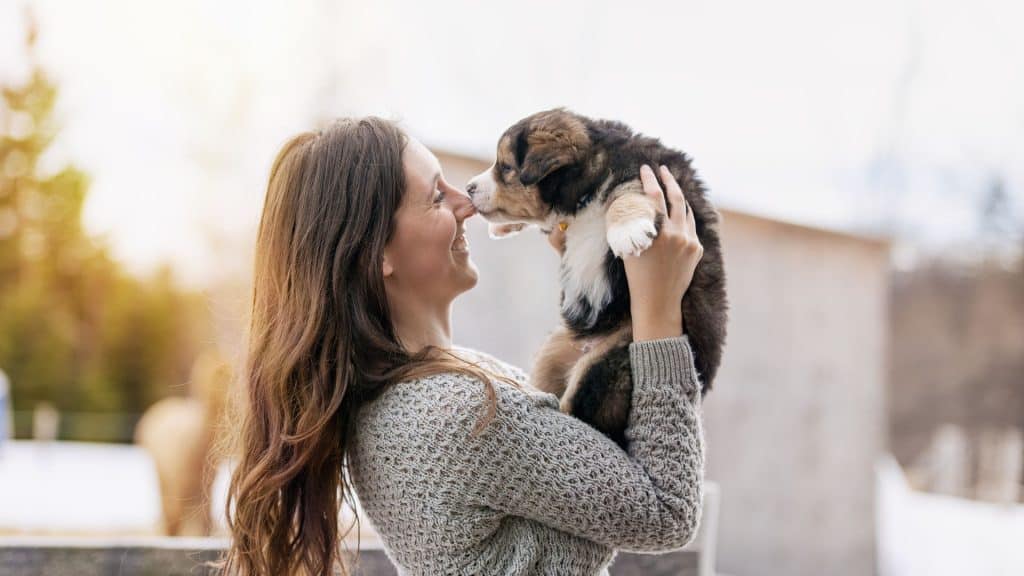
Most dog owners are familiar with the occasional panting and heavy breathing that can come with exercise or warm weather.
However, if your dog struggles to breathe even when resting, it could be a sign of a more severe condition.
You can do a few things to help your dog breathe more easily.
First, make sure they have plenty of fresh water to drink.
Keeping them hydrated will help to thin out mucus and reduce congestion.
You can also try elevating their food bowl, so they don’t have to strain their neck while eating.
Finally, give them regular baths with a mild shampoo to help clear away any irritants that might aggravate their condition.
By taking these simple steps, you can help your dog breathe easier and enjoy a better quality of life.
Dog Breathing Fast Causes Breathing Problems
If you’ve ever had a dog, you know that one of the things they do best is breathed.
Whether panting after a run or nap, dogs always seem to be breathing. But sometimes, dogs can breathe too fast.
While it might not seem a big deal, fast breathing can signify a severe problem.
Breathing fast can increase heart rate and blood pressure, which can strain the heart.
In some cases, it can even cause seizures or collapse.
If you notice your dog breathing fast, it’s essential to take them to the vet immediately.
While it might not be an emergency, it’s always better to be safe than sorry.
Puppy Rapid Breathing
Puppies are adorable creatures that offer us endless hours of love and companionship.
They make great family pets, and their small size makes them perfect for city living.
However, puppies aren’t always easy to care for; one common issue is rapid breathing.
If your puppy is panting heavily or taking short, quick breaths, it’s essential to take action.
Rapid breathing can signify heatstroke, respiratory infection, or heart disease.
If your puppy is panting excessively, try to cool them down by offering cool water or placing them in a shady spot.
If they’re still experiencing rapid breathing, it’s essential to seek veterinary attention as soon as possible.
Understanding the causes of puppy rapid breathing and knowing how to respond can help your furry friend stay healthy and happy.
What’s Normal Breathing in Dogs?

Most people know that dogs pant to cool themselves off, but did you know that they also breathe differently than we do?
For starters, dogs have a much higher respiratory rate than humans.
While the average human takes around 12-20 breaths per minute, dogs take anywhere from 30-60 breaths per minute.
And unlike us, dogs can’t sweat through their skin.
So when they’re trying to cool down, Panting helps them to evaporate moisture from their tongues and exposed soft tissues.
They also use their tails as fans to help circulate air and create evaporative cooling.
But why do some dog breeds pant more than others?
It turns out that it depends on their body size and shape.
Smaller dogs have a higher surface area to body ratio, which means they lose heat faster.
And dogs with long snouts (like greyhounds) have more efficient respiratory systems, so they don’t have to work as hard to breathe.
So next time you see your dog panting, remember that it’s just their way of staying cool!
Why Is My Puppy Breathing Hard or Heavy?
There could be several reasons why your dog is breathing heavily.
It could be because they’re excited, they’re exerting themselves, they’re hot, or they have an underlying medical condition.
If your dog is usually active and healthy, then it’s likely that they’re just panting to cool down.
Dogs don’t sweat through their skin as we do, so they rely on panting to evaporate moisture from their lungs and regulate their body temperature.
However, if your dog is panting excessively or their breathing is labored, it could signify a more serious problem.
If your dog has difficulty breathing, it’s essential to seek veterinary care immediately.
FAQs
When Should I Be Concerned About My Puppy’s Breathing?
If your puppy is panting excessively, try to cool them down by offering cool water or placing them in a shady spot. If they’re still experiencing rapid breathing, it’s essential to seek veterinary attention as soon as possible.
Why Is My Puppy Breathing so Fast?
Puppies can get very excited and may start breathing fast after playing or meeting new people.
Why Is My Dog Breathing Fast While Lying Down?
Several potential causes for your dog’s labored breathing include exercise, allergies, and heart disease. See a vet if the problem persists.
Are Puppies Supposed to Breathe Fast While Sleeping?
Yes, it is normal for puppies to breathe fast while sleeping. It usually means they are comfortable and relaxed.
Why Is My Dog Breathing Heavy While Resting?
There are a few potential reasons why a dog might be breathing heavily while resting, including age, obesity, and heart problems.
Are 40 Breaths per Minute Normal for A Dog?
Yes, 40 breaths per minute are expected for a dog. If your dog’s breathing rate exceeds this, it may be cause for concern, and you should take your pup to the vet.
When Should I Be Concerned About My Puppy’s Breathing?
You should consult a veterinarian if your puppy is panting rapidly and has difficulty breathing.
Why Does My Puppy Breathe Fast and Hard?
There are various reasons why a puppy might be breathing hard, including anxiety, excitement, or respiratory problems.
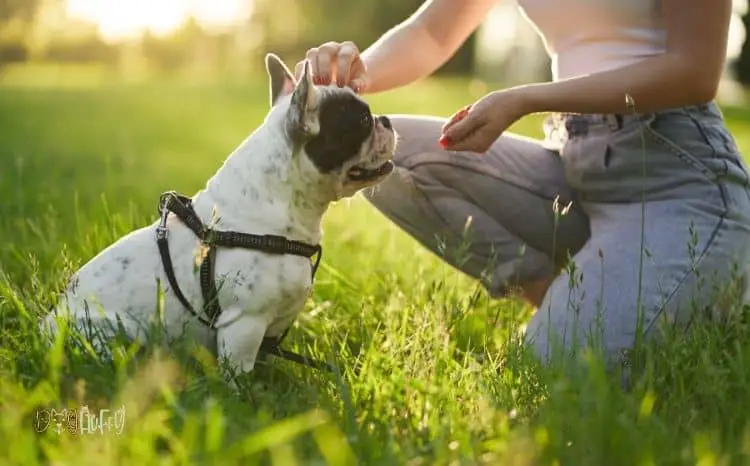
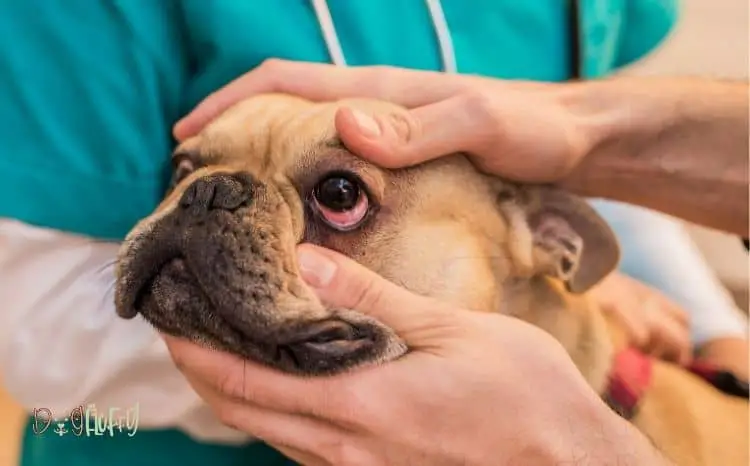
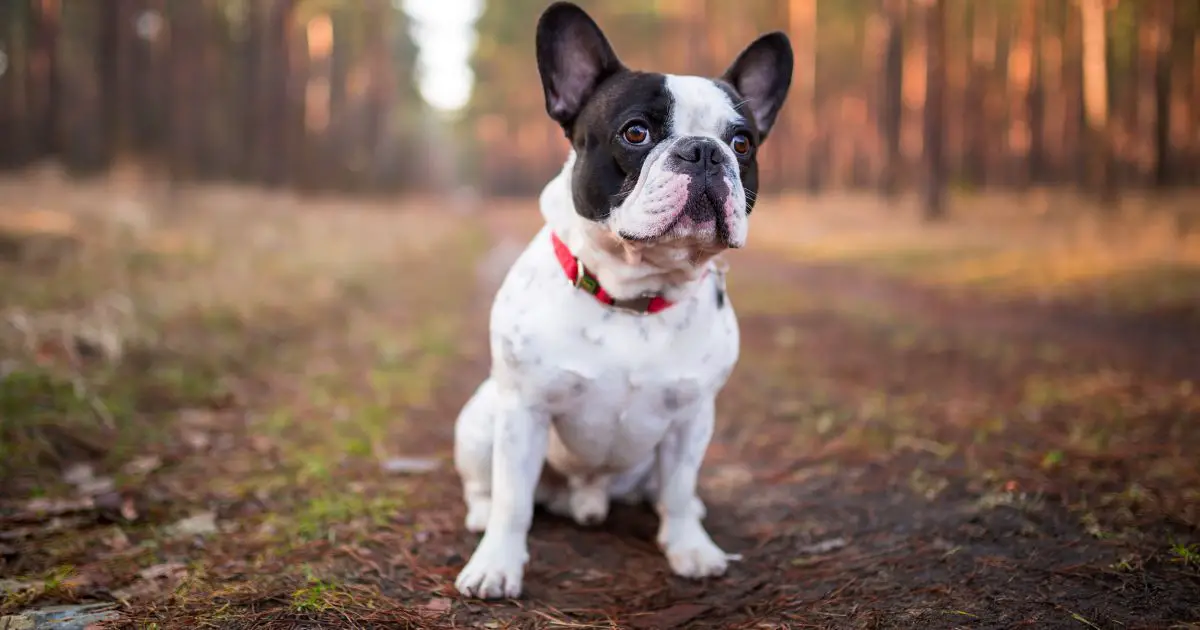
Leave a Reply
You must be logged in to post a comment.